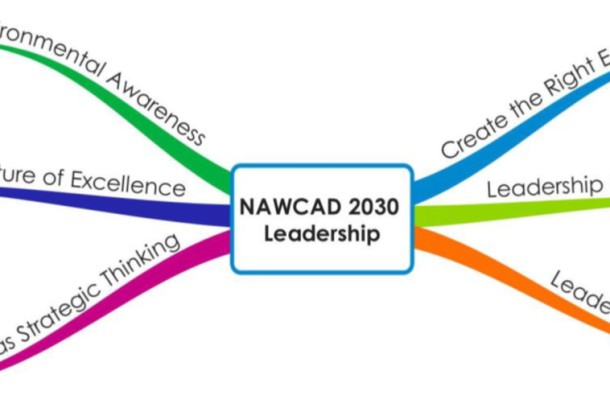Strategic Thinkers Needed to Make the World Safer

There were “a zillion pieces” in MMOWGLI corralled into 125 open-source pages and further condensed into a 30-minute non-stop PowerPoint “roadshow.” The findings suggest some straightforward ways to strategically think and plan into the extreme future. But implementation is difficult when making large-scale changes.
The core premise of MMOWGLI (Massive Multiplayer On-Line War Game Leveraging the Internet) is this: At the rate the world and technology are changing everything from warfighting to shopping, thinking about and planning for 2030 can simply not be accomplished in the old ways. Old ways are too linear and come from too small of a pool of thinkers.
The old ways won’t win in the new world, explains Dr. Dale Moore, Director, NAWCAD Strategic Cell. The MMOWGLI isn’t his first roadshow. He continues to present refinements of NAWCAD’s 2030 Strategic Assessment year after year, including the ongoing Strategic Thinking Brown Bag series sponsored by The Patuxent Partnership in Lexington Park, MD.
This is Dr. Moore’s message: If the old ways are having trouble today they surely won’t position us well for the future – staying aware of what’s happening around us, thinking about the implications, and learning to change and adapt in ways that pace the environment will be critical to staying ahead as world leaders.
But changing how people think is a different matter. And, how do we even focus our attention and make sense in a world of a zillion rapidly moving parts?
It doesn’t take a minute for Dr. Moore to convince an audience of the importance NAVAIR plays in the world’s future, strategically located at every choke point on the globe in a time of mounting tensions and terror. NAWCAD’s MMOWGLI was designed “to shape the future of our organization and ultimately our nation” said Mr. Gary Kessler during the playing of the MMOWGLI “Call to Action” video.
The Massive Multiplayer On-Line War Game Leveraging the Internet was created by US Navy sponsorship out of the Office of Naval Research and hosted on-site at the Naval Postgraduate School. The process blends gaming and social media to crowd source solutions to extremely complex problems. The first game in 2011 produced some easily performable solutions to the growing piracy off the coast of Somalia, drawing 2,000 registrants and 800 active players.
NAWCAD’s MMOWGLI invited roughly 6,000 participants resulting in over 600 active players, a 10 percent result Dr. Moore praised, and said was a great turn-out given the early stages of this “game-changing” technology. Play was confined to 10 days, players signed in any time, play consisted of submitting “cards” with ideas and/or responses to ideas already in play. Cards were 140 character limited and 5,455 cards were played. The responses on the cards were triggered by a total of 80 strategic questions administered by the NAWCAD and NPS Game Masters at the rate of eight a day. Thirty-five action plans resulted from game play.
The play confirmed prior strategic thinking as well as produced some “disruptive” surprises. The results emphasized the growing need to encourage broader, out-of-the-box strategic thinking, to foster a climate of learning and experimentation without judgment in the workplace; and for more open leadership to allow and reward freer generation and flow of knowledge and ideas. Organizational wisdom was “ultimately the place we need to end up,” suggests Dr. Moore, while innovation adheres to a principle of “fail fast, fail often, fail safely” as the proven path to accelerate learning.
Play produced new insights and perspectives that can help guide the direction of our thinking. We need to get to a place of “knowledge dominance,” said Dr. Moore. He also noted one of the messages that emerged, “goes beyond information dominance dominated by systems.”
“The web is evolving toward a global consciousness,” and it is conceivable that today’s reality will bend significantly by 2030, and given the “internet of things” we may be able alter the 4th dimension i.e. the perception of time.
The implication here, explains Dr. Moore, is how much work in the future can be done autonomously. Looking at the future nature of work, “the creative side of the world becomes more important because computers can’t do that, yet…”
Tellingly, the creative side of the world is not always recognized amid the preponderance of linear thinking in today’s society and education systems. One of the MMOWGLI findings highlighted in Dr. Moore’s presentation was the growing importance of communication. This was mentioned in different ways, but repeatedly calling for greater human social interaction through “meaningful and constructive dialogue and collaboration.”
At one point calling for more “storytelling” to enhance learning and thinking, calling storytelling a “legitimate alternative way of thinking,” while also stressing the importance of harnessing narrative “big data” to help make sense of the turbulent and uncertain world around us.






















